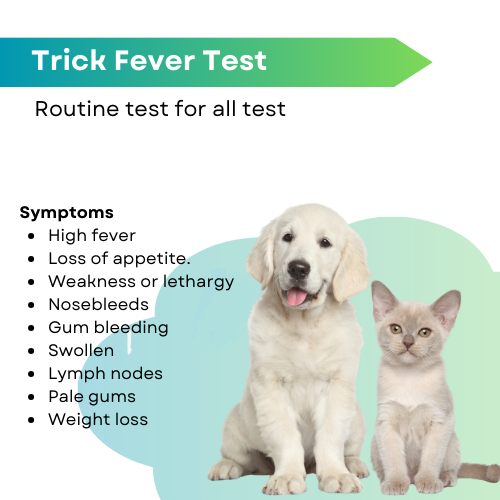Tick Fever Test
₹1,299.00
Tick fever, also known as canine ehrlichiosis or babesiosis, is a condition caused by tick-borne pathogens that infect dogs. A Tick Fever Test is usually conducted to diagnose this condition and involves detecting the presence of these pathogens in the dog’s blood.
About this service
Description
It will use a combination of tests to diagnose tick fever in pets, including:
Physical examination: A veterinarian will look for symptoms like fever, lethargy, joint pain, and other signs of tick fever.
Blood tests: Blood tests can detect antibodies or pathogens associated with tick-borne diseases. Common blood tests include the Indirect Immunofluorescent Antibody (IFA) test, Enzyme-Linked Immunosorbent Assay (ELISA), PCR, peripheral blood smear, and CBC. Blood test results that point to tick fever include low platelet count, anemia, and abnormal white blood cell counts.
Microscopic examination: Identify the organism directly under a microscope. This is done by examining blood and organ smears from sick or dead animals. Tick fever, also known as canine Rocky Mountain spotted fever (RMSF), is a potentially fatal disease caused by the bacteria Rickettsia rickettsii. It can also occure by Eherlichia or Babesia. The only proven cure for tick fever is the antibiotic Doxycycline.
Treatment
If diagnosed with tick fever, the treatment generally includes:
- Antibiotics (e.g., doxycycline for ehrlichiosis)
- Antiparasitic Drugs (e.g., imidocarb for babesiosis)
- Supportive care like fluid therapy, pain management, and blood transfusions if necessary.
If you’re managing this at Cadovate, you could offer tick fever testing at the pet clinic along with prevention measures, like advising pet owners about tick repellents, regular grooming, and timely vaccinations.

